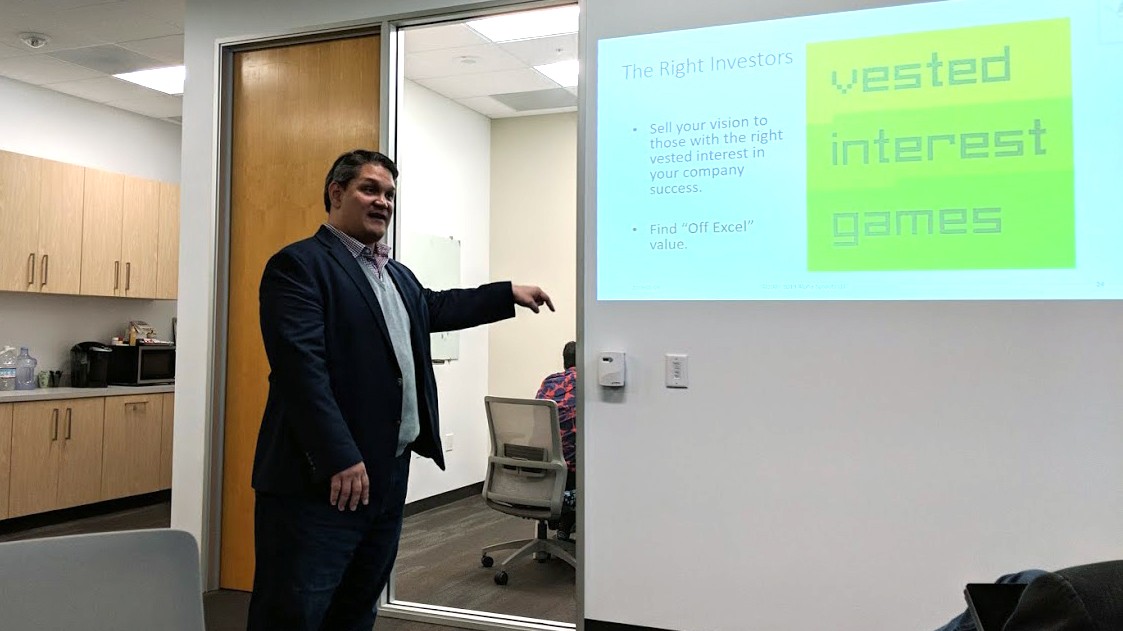Yesterday at the CSUF Startup Incubator (Irvine) we were honored to have David Ochi give a talk about startup funding. As you may know, or at least have suspicions about, funding a startup is, despite the successes seen on TV shows like Shark Tank, no easy task but after David’s talk yesterday it’s pretty obvious that startup funding is more difficult than most imagine it to be.
First, a little bit about David. David Ochi is a serial entrepreneur, professor, and investor. His LinkedIn profile has more information about him and if you ever have the chance to meet him you will know that he is a nice, generous man. Based off of a simple perusal of his CV you can easily see that he has extensive knowledge of the funding scene from the perspective of an investor as well as an entrepreneur. And that experience was on full display at the CSUF Startup Incubator yesterday.
How Many Startups Receive VC Funding at the Beginning?
David provided two statistics that were very bracing. One was that out of all the companies that are started only 0.02% ever receive funding from a VC (venture capitalist). Sure, that doesn’t include the companies that receive funding from other kinds of investors, most prominent among those being Angel Investors in most peoples’ minds, but this fact should still serve as a wakeup call for anyone that is thinking that they will be able to raise money with just an idea.
How Many Companies worth $1B Started off with Funding from VCs?
The other major statistic that David shared was that out of all the billion dollar companies out there only about 6% of them started out with VC funding. Most unicorns (private companies worth more than $1B) don’t start receiving funding from VCs until much later on in their lifecycle. And the reason is pretty straightforward, according to Forbes:
The bad news is that the seed and early-stage companies are struggling and don’t get as much funding. Why do young companies have difficulty attracting the attention of major VCs? There are two main reasons, and it doesn’t necessarily have to do with the concept of the startup. The first (and perhaps most obvious) reason is that bigger deals with proven companies are less risky than investments made in early-stage companies.
The second—and maybe more important—reason is the VCs’ 2%/20% model. A typical deal provides VCs with two-percent of annual fees going to operations (rent, salaries, etc.) and 20% of the existing value of the deal or company. Structurally VCs have to write big checks to cover their operating expenses and work really hard on fewer investments to ensure they get a high return on investment. So, plainly put, most VCs just don’t have the bandwidth for small/early-stage companies.
Early Stage Startups Are Struggling, While VC Investment Dollars Are At All Time High from Forbes
Obviously, there are some startups that do receive funding from other sources than VCs early on but, based off of my own observations and anecdotal evidence, I’m with David on this one. If you are going to start a business and you must have some kind of funding from an outside source then you better have good connections, a killer idea, and an all-star team because you will probably not receive any funding otherwise (from VCs, Angels, and other assorted “professional” investors). You’re better off scaling back your concept and figuring out a way to launch with the resources that you currently have.
As a small-time investor myself, I can tell you that even when talking about small amounts of seed funding the kinds of businesses that do not (and, no, that’s not a misprint) end up receiving funding from the group I am a part of can be really solid startups; they’re just missing something compared to the others that pitch us (or us investors could be missing something, which is probably more likely the case).
None of this is meant to dissuade you from even considering starting up your own business. Far from it. What all of this means, which is that most businesses do not receive investment capital from professionals early on (if ever), is that it’s okay if you can’t raise money early on. You probably don’t need to raise funds anyway. If you can launch your business and grow it organically by reinvesting your profits alone, that’s awesome!
And, as David stressed during his talk, lest you think that these VCs and other professional investors are all getting rich off of their investments in hard-working entrepreneurs, think again. Investors are subject to the Pareto Principle just like the rest of us and, for them, that means only a very small handful of investors make most of the money.
tl;dr
Starting a business is hard work and unless you have a fantastic team and one of the best startup concepts ever, chances are you will not be able to raise any money to start. Instead, focus on launching your business the right way, the way we teach entrepreneurs at the CSUF Startup Incubator.
CSUF Startup Incubator
Entrepreneurs who are accepted into the CSUF Startup Incubator work with our entrepreneurial experts over a six month intensive launch period that includes: access to office space, quarterly investor pitches our entrepreneurs can participate in, free events, a dedicated one-on-one coaching relationship with one of our more than 700 startup experts, and so much more! If you are ready to learn the right way to go from concept to launch, please go to this page or contact a CSUF Startup Incubator representative at csufentrepreneurship@fullerton.edu.
